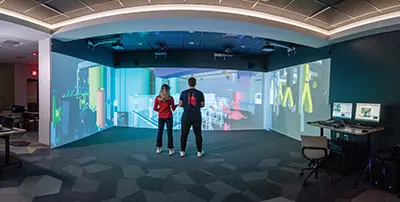This example four-year plan is provided as a broad framework that you can follow in order to complete your degree within four years. Be sure to always consult your academic advisor before registering for classes.
This course prepares students for the study of calculus, physics and other courses requiring precalculus skills. Included is solving systems of equations, the analysis and graphing of linear, quadratic, polynomial, exponential, logarithmic, rational functions, the unit circle, and triangle (right and non-right) trigonometry. Prerequisite: MATH 106 with a grade of C or better or demonstrated competency through placement testing. Restrictions: not open to students who have completed 205, 206, or any 300 level mathematics course successfully.
In this course, students gain understanding of and confidence in strategies for effective writing by composing and reading in a variety of genres. The course emphasizes writing as a process and focuses on the rhetorical choices writers make. Students engage critically with sources by examining how genre, context, purpose, credibility, and bias work together to create meaning and impact audiences. Students who choose to take Writing I Workshop are provided with time during class to work on their writing while the instructor and a writing tutor are present to provide assistance. Students must earn a “C” or higher in order to pass this course
The First Year Seminar (FYS) is part of the Core Curriculum and a requirement for all incoming first year students and transfer students with fewer than 15 credits. The First Year Seminar is a theme-based inquiry course that engages students in a specific area of interest while providing support for a smooth transition into the Lasell University community and the Connected Learning philosophy. Through studying an academic topic, students develop and apply core intellectual skills and receive an introduction to the core knowledge perspectives. At the same time, students connect to the experiences and people that make up the Lasell University Community. Course outcomes are accomplished through engaging activities including reading, writing, class discussions, presentations, team projects, field trips, and exploration of campus resources. Civic engagement and service-learning activities are often part of this course as is participation in the Connected Learning Symposium. Through the seminar, students develop close ties with faculty and peer mentors who serve as advocates for first year students' academic success. Past course titles have included: The Immigrant Experience, Fashion & Film of the 20th Century, The Social History of Rock & Roll, Exploring Cultures & Languages, The Spark of Creativity, Women and Sports, and Latin America: Food And Traditions. This requirement may be fulfilled by taking either FYS103 or HON101 (for students enrolled in the Honors Program).
This course provides a description of the various health care professions including educational and licensing requirements. The concepts of professionalism, health care teams, and current health care policies will be covered. Students will increase their knowledge of the various health care professions through job shadowing.
This lecture and laboratory course is the second semester of a year-long introductory biology sequence which explores the scientific study of life. Topics include introductions to Darwinian evolution, principles of inheritance, evolution & immunity, and a survey of human body systems & homeostatic mechanisms. The laboratory provides an environment for active learning to support understanding of concepts presented in the course. Prerequisite: BIO101 with a C or better. Corequisite: BIO102L.
This course focuses on evaluating and implementing healthy lifestyles and human behavior for longevity of lifespan from adolescence through adult development. Focus will be placed upon cultivating a holistic approach to health and wellness that is rooted within strategies for implementing healthy lifestyle changes, as well as "living through prevention": a description relating to methods of preventing long term disease and disability.
This course is a continuation of Writing I and focuses on research and public writing. Theme-based courses provide students with lenses to explore issues of interest and develop their reading, research, and writing skills. Students work with a topic of their choice, broadly based on the course theme. Assignments build upon each other, lead up to a researched position paper, and culminate in a public piece. Students who choose to take Writing II Workshop are provided with time during class to work on their writing while the instructor and a writing tutor are present to provide assistance. Students must earn a grade of “C” or higher in order to pass this course. Prerequisite: WRT 101
Equity & Intersectionality(KP)
